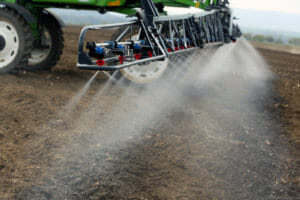Paraquat, one of the most commonly used commercial herbicides in the United States, could be linked to Parkinson’s disease. The attorneys at McWhirter, Bellinger & Associates are reviewing potential lawsuits from licensed paraquat applicators and others who have been diagnosed with the disease after paraquat exposure.
If you or a loved one have been diagnosed with Parkinson’s disease after coming into close contact with paraquat, our South Carolina personal injury attorneys are interested in hearing your story.
What is paraquat?
Paraquat is a toxic chemical that is widely used as a herbicide, primarily for weed and grass control. The US Environmental Protection Agency (EPA) classifies it as “restricted use,” meaning it can only be used by people who are licensed applicators.
The chemical is so toxic that each bottle comes with a warning that says “one sip can kill.” However, plaintiffs in lawsuits across the country are alleging that distributors of paraquat are well aware of its link to Parkinson’s disease and have intentionally failed to warn consumers, conduct proper research, or ensure that consumers are adequately protected when using the chemical.
Some of the largest manufacturers of paraquat include Syngenta and Chevron Chemical. Although Syngenta is a Swiss company, the herbicide has been banned in that country since 1989. It is also banned in 31 other nations across the globe.
However, it continues to be used in the United States – and it’s rising in popularity. The total amount of paraquat usage in the US doubled between 2006 and 2016, according to the National Water-Quality Assessment (NAWQA) Project.
Which weed killers contain paraquat?

- Para-SHOT
- Blanco
- Devour
- Firestorm
- Helmquat
- Ortho-Paraquat
- Parazone
- Quick-Quat
Is there a link between paraquat and Parkinson’s disease?
Over the past two decades, the scientific community has stepped up its research of the effects of paraquat exposure on humans.
The chemical’s compounds are believed to be toxic to mitochondria, the powerhouses of a cell, leading to the death of dopamine-producing neurons in the substantia nigra – a brain area specifically involved in Parkinson’s disease.
Here are some study results:
- A 2018 study published in the Federation of American Societies for Experimental Biology (FASEB) found that even low-level exposure to paraquat can disrupt cells in a way that mimics the effects of mutations linked to Parkinson’s disease
- A 2017 study published in Nature Chemical Biology concluded that paraquat generates reactive oxygen species (ROS), which causes cell death
- A 2011 study from the National Institute of Environmental Health Sciences concluded that “Parkinson’s disease was strongly associated with” paraquat
- A 2011 study from the National Institutes of Health (NIH) concluded that exposure to paraquat could be linked to a greater risk of developing Parkinson’s disease
- A 2009 study published in the American Journal of Epidemiology revealed that any exposure to paraquat within 1,600 feet of a home resulted in a heightened Parkinson’s disease risk of 75%
One of the authors of the FASEB study said that “people exposed to these chemicals are at about a 250% higher risk of developing Parkinson’s disease than the rest of the population.”
What other dangers does paraquat pose?

In addition to its possible connection to Parkinson’s disease, the Centers for Disease Control and Prevention (CDC) says that small to medium amounts of paraquat may lead to development of the following:
- Heart failure
- Kidney failure
- Liver failure
- Lung scarring
Large amounts of paraquat can lead to the following symptoms within a few hours to a few days:
- Acute kidney failure
- Confusion
- Coma
- Fast heart rate
- Injury to the heart
- Liver failure
- Lung scarring (fast acting)
- Muscle weakness
- Pulmonary edema
- Respiratory failure
- Seizures
The CDC has warned that “people with large ingestions of paraquat are not likely to survive.”
Do I have a personal injury case?
If you or a loved one have been diagnosed with Parkinson’s disease after working in agriculture, being a farm worker, or living in an area near farms, orchards, or vineyards, you may be entitled to receive compensation for:
- Medical bills
- Pain and suffering
- Disability or permanent injury
- Lost wages/loss of earning capability
- Punitive damages
- Rehabilitation costs
- Wrongful death
The defective products attorneys at McWhirter, Bellinger & Associates have been fighting for victims of dangerous products for over 40 years. Our experience speaks for itself, and we will do everything we can to fight for you.
We have offices throughout the state, in Aiken, Camden, Columbia, Lexington, Newberry, Orangeburg, and Sumter.
If you believe your Parkinson’s disease may have been caused by paraquat use, call us right away at 803-590-9242 for a free case evaluation. It won’t cost you anything to see if we can help.















